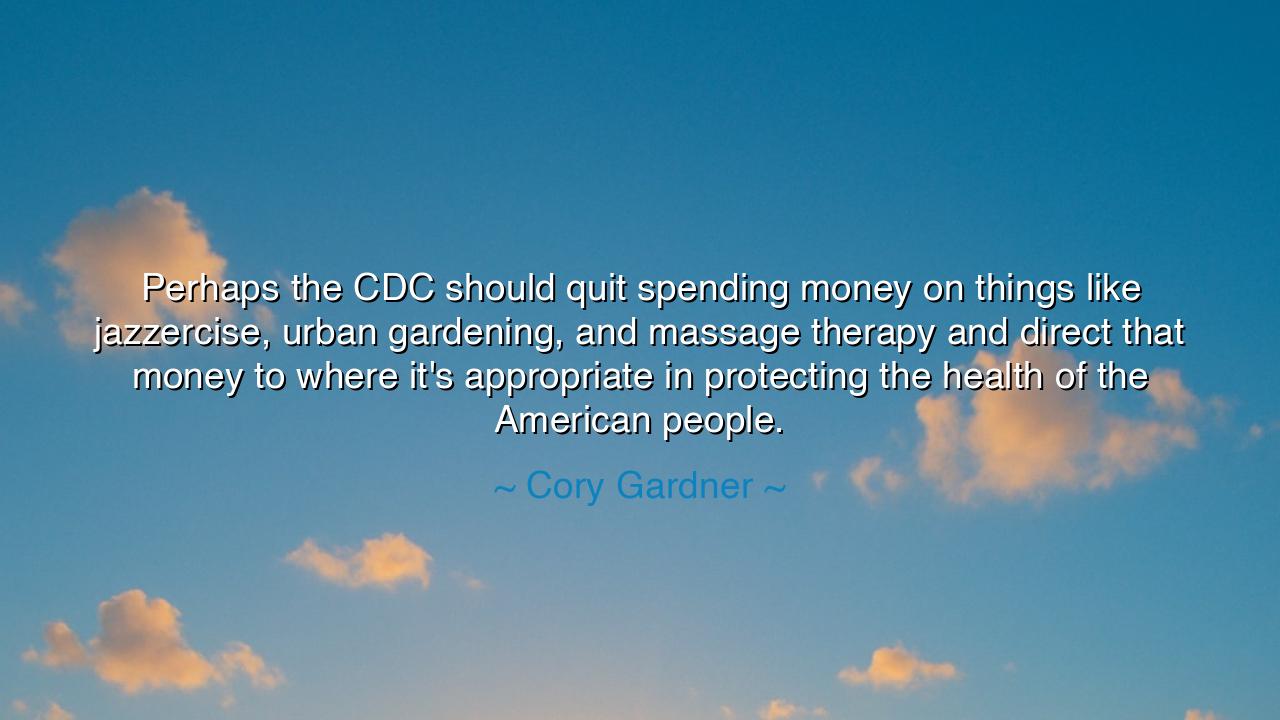
Perhaps the CDC should quit spending money on things like
Perhaps the CDC should quit spending money on things like jazzercise, urban gardening, and massage therapy and direct that money to where it's appropriate in protecting the health of the American people.






In the age-old quest for the well-being of the people, we often face a deep and challenging question: where should the resources go? Cory Gardner, in his reflection, raises a point that strikes at the heart of the modern dilemma: "Perhaps the CDC should quit spending money on things like jazzercise, urban gardening, and massage therapy and direct that money to where it’s appropriate in protecting the health of the American people." This statement is more than a critique; it is a call to reconsider the priorities that govern not only public health policy but the larger purpose of societal investment. It speaks to the ancient wisdom that true protection and nourishment come not from distractions or superficial remedies, but from understanding the deeper needs of the body and the spirit.
In the great philosophical traditions of old, the Greek philosophers often debated the nature of health and well-being. The word therapeia, from which we derive “therapy,” originally referred not just to physical treatments but to the restoration of balance between the body, the mind, and the community. The ancient world was not without its diversions, but the focus was always on the greater good—the well-being of the individual must be aligned with the well-being of the society. Thus, when resources were allocated, the emphasis was placed on addressing fundamental issues: the nourishment of the body, the care of the sick, and the strengthening of the community's moral fabric. The ancients would surely understand Gardner’s point: to truly protect the people, we must prioritize the most pressing and meaningful needs.
Yet, in today’s world, the matter is not so clear. The notion of health has been transformed. It is no longer just about curing disease but about creating an idealized life that is as free from discomfort as possible. In the modern era, we often find ourselves spending resources on what might seem like fleeting pleasures or distractions—things that offer temporary relief but fail to address the root causes of health challenges. While jazzercise, urban gardening, and massage therapy have their place in maintaining balance and relieving stress, the true question lies in whether these pursuits are sufficient to address the greater societal ills that often go unnoticed or unaddressed: mental illness, poor nutrition, and lack of access to proper medical care.
Consider the ancient example of Hippocrates, the great physician who is often called the father of modern medicine. His teachings emphasized that the body is a reflection of the mind and the environment, and that to treat the body, one must address the environment and the lifestyle of the individual. He would likely agree with Gardner’s point that, while smaller pursuits such as personal exercise and stress relief can be beneficial, they must not replace the fundamental need for society to focus its resources on public health infrastructure—on ensuring that all people have access to basic care, nutritional support, and disease prevention.
Similarly, in the ancient civilization of Rome, public health was a cornerstone of societal development. The Romans built aqueducts, created advanced sewage systems, and ensured that public baths were available to all citizens—not as distractions, but as means of preventing disease and promoting overall public well-being. These investments were aimed at the long-term health of the population, addressing the most pressing needs of the people, and preventing the spread of illness. Gardner’s argument is in line with this wisdom: if society is to spend its resources wisely, it must focus on the core needs of the people, not on temporary band-aids.
At the heart of Gardner’s argument lies the belief in the efficiency of resources. Just as the ancients understood that there must be careful consideration of where time, energy, and resources are directed, so must we today. If we are to ensure the health of the American people, we must look beyond short-term solutions and think about the larger framework—the public health system that addresses the root causes of health crises. For, as the ancients taught, true health does not come from fleeting distractions but from deep, sustainable systems that nurture the body and mind in harmony.
So, let us take this lesson to heart: that in all things, we must seek balance and wisdom in the way we allocate our resources. While it is important to have avenues for personal enjoyment and stress relief, let us not forget the fundamental importance of addressing the greater needs of the community. Public health—like the systems of the Romans or the teachings of Hippocrates—must prioritize the long-term well-being of the people. Let us, therefore, direct our energies toward the foundational care of society, ensuring that we build a system that supports the health, education, and welfare of all citizens. In doing so, we honor the true legacy of those who came before us, who understood that the path to health is one of wisdom, efficiency, and the shared good.






AAdministratorAdministrator
Welcome, honored guests. Please leave a comment, we will respond soon